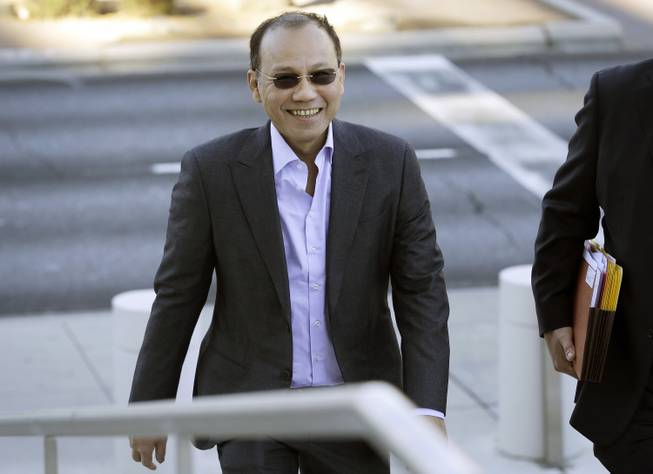
AP Photo/John Locher,File
FILE - In this Nov. 6, 2014 file photo, Wei Seng Phua walks into federal court in Las Vegas. Phua, his son Darren Wai Kit Phua, and four others were arrested in July after federal agents raided three high-roller villas at Caesars Palace in Las Vegas. Lawyers for Phua and his son are due on Monday, Dec. 15, 2014 to ask a federal judge in Las Vegas to throw out evidence in an international Internet gambling case because FBI agents posed as repair technicians to get into their clients’ suites at Caesars Palace.
Published Monday, Dec. 15, 2014 | 12:21 p.m.
Updated Monday, Dec. 15, 2014 | 3:38 p.m.
LAS VEGAS — An FBI agent was grilled Monday in federal court about whether investigators intentionally deceived a federal magistrate to obtain a warrant and arrest a Malaysian businessman, his son and six others who prosecutors say were running an illegal international Internet sports gambling operation.
FBI Special Agent Minh Pham repeatedly acknowledged failing to inform the magistrate judge who issued the warrant that agents had a Caesars Palace contractor intentionally disable Internet service to three suites, then posed as repair technicians to gain entry and collect evidence for search warrants.
"I didn't think it was important to provide all the details," Pham testified during tense and painfully detailed cross-examination by Thomas Goldstein, attorney for Wei Seng "Paul" Phua, 50, and his son, Darren Wai Kit Phua, 23. They are accused of running the $13 million gambling operation out of the high-roller suites.
Goldstein pressed harder. Had Pham ever heard of another law enforcement agency disrupting Internet, telephone or electric service to induce a target of an investigation to invite agents into a residence?
No, Pham answered. Not exactly. "But we always use ruses in undercover operations," he said.
Pham testified that after an assistant U.S. attorney in Las Vegas didn't immediately endorse the idea of FBI and Nevada Gaming Control Board agents posing as computer technicians, he didn't ask her again.
Time was running out on the chance for illegal betting on the FIFA World Cup soccer tournament, and he did continue to talk about the ruse with his FBI supervisory agent and bureau attorneys.
Goldstein and David Chesnoff, the attorney for Darren Phua, want U.S. Magistrate Judge Peggy Leen to throw out any evidence against the Phuas as the tainted result of an unconstitutional search.
Federal law generally requires a person to waive constitutional protections against unreasonable searches unless authorities obtain a warrant. Evidence collected improperly is not supposed to be used at trial.
The defense attorneys argue that no American could feel safe at home if searches could be based on similar deceptions.
They point to questions about Drug Enforcement Administration agents setting up a fake Facebook account using photographs and other personal information from the cellphone of a New York woman arrested in a cocaine case in hopes of tricking her friends and associates into revealing incriminating drug secrets.
In another case, the FBI sent a fake news story it attributed to The Associated Press to trick a suspect in a bomb-threat case into clicking on the website link and revealing his location. The AP objected that the FBI practice was "unacceptable" and "undermined AP's credibility."
Goldstein suggested the FBI was motivated from the start of its investigation by the prospect of being able to confiscate Paul Phua's multimillion-dollar Gulfstream private jet.
The value of the aircraft, which was impounded at McCarran International Airport as a condition of Phua's release on $2 million bail, was variously described Monday as between $30 million and $50 million.
Chesnoff and Goldstein also dispute prosecutors' claims that Phua is a member of a Chinese organized crime group called the 14K Triad.
Pham said the FBI was aware of Phua even before he was arrested June 18 in the Chinese gambling enclave of Macau and accused of similar allegations of illegal wagering on World Cup soccer games. He flew days later to Las Vegas, where he was arrested July 13.
Monday's hearing came after five Chinese citizens pleaded guilty last week to reduced charges in the case, paid fines and forfeited hundreds of thousands of dollars each in return for sentences of probation and an order to leave the U.S. and not return for at least five years.
Hui Tang, 44, was the only one to plead guilty to a felony — illegal transmission of wagering information. He was fined $250,000 and ordered to forfeit $250,000 in cash and electronic equipment.
Charges were dropped against a sixth person, who also agreed to return to China.
The Phuas face felony charges including operating an illegal gambling business and unlawful transmission of wagering information charges that each carry a possible penalty of up to seven years in prison.

Join the Discussion:
Check this out for a full explanation of our conversion to the LiveFyre commenting system and instructions on how to sign up for an account.
Full comments policy